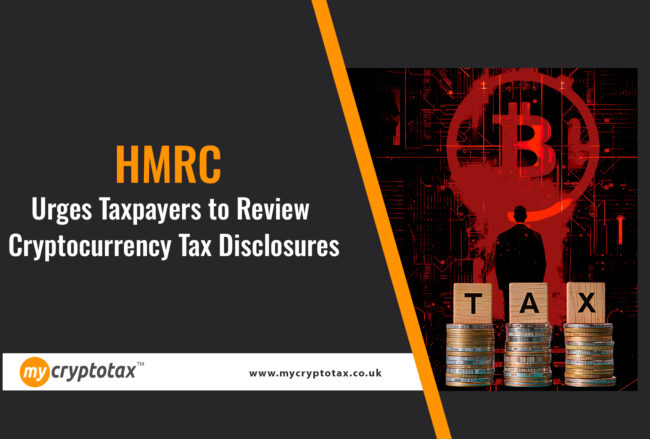HMRC Urges Taxpayers to Review Cryptocurrency Tax Disclosures

HMRC (Her Majesty’s Revenue and Customs) has begun reaching out to individuals who have disposed of Cryptocurrency, such as BTC ,ETH or any ALT coins, to alert them that they may not have paid the correct amount of tax.
HMRC has provided an example letter, which explains where to find guidance from HMRC on the taxation of cryptoassets.
![[Tags] 1-1024x576 HMRC Urges Taxpayers to Review Cryptocurrency Tax Disclosures](http://mycryptotax.co.uk/wp-content/uploads/2024/08/1-1024x576.jpg)
Common Cryptocurrency Tax Misconceptions.
Many taxpayers might not realize that their actions involving Cryptocurrency could trigger a taxable event, leading to a potential tax liability. There is a common misconception that a taxable gain only arises when a digital asset is converted back into traditional currency, such as pounds or dollars. However, this is not the case.
Taxable gains can occur under a variety of circumstances, including:
- Exchanging one Cryptocurrency for another: If you trade one type of cryptocurrency for another, such as swapping Bitcoin for Ethereum, this constitutes a disposal and may result in a capital gain or loss, which must be reported.
- Using a Cryptocurrency to purchase goods or services: When you use Cryptocurrency to buy items or pay for services, this transaction is treated as a disposal of the asset, potentially generating a taxable gain.
- Gifting a Cryptocurrency to someone other than your spouse or civil partner: If you give away Cryptocurrency to anyone other than your spouse or civil partner, the transfer is considered a disposal for tax purposes, and any gain on the asset may be subject to tax.
In addition to capital gains tax, the letter from HMRC also reminds recipients that they might be liable for income tax and national insurance contributions depending on the nature of their Cryptocurrency -related activities. This could include income derived from activities such as:
- Lending: Earning interest or other rewards from lending Cryptocurrency.
- Staking: Receiving income from participating in proof-of-stake networks.
- Mining: Generating new Cryptocurrency through mining activities, which may be considered taxable income.
HMRC’s initiative underscores the importance of understanding the tax implications of all Cryptocurrency transactions, ensuring that individuals correctly report their activities and meet their tax obligations.
Don’t Overlook a Cryptocurrency Nudge Letter from HMRC
If an individual receives a letter from HMRC indicating that they may owe additional tax related to their cryptocurrency transactions, they should take immediate steps to address the situation . This is crucial for ensuring that the issue is addressed promptly and correctly.
![[Tags] 1-1024x576 HMRC Urges Taxpayers to Review Cryptocurrency Tax Disclosures](http://mycryptotax.co.uk/wp-content/uploads/2024/08/2-1-1024x632.jpg)
Given the complexity of tax regulations surrounding cryptocurrencies, it may be beneficial to seek advice from a specialist crypto accountant, such as My Crypto Tax. We are well-versed in the intricacies of cryptocurrency taxation and can provide tailored guidance to ensure compliance with HMRC’s rules. Consulting with a crypto tax specialist can help you accurately assess your tax obligations, amend any previous errors, and minimize the risk of penalties
Amend Tax Returns: If the individual has already submitted a tax return, they may need to amend it to reflect the correct amount of tax owed. Generally, an individual can amend their tax return up to 12 months after the original deadline for submitting the return. For example, if the deadline was January 31, 2024, they would have until January 31, 2025, to make any necessary amendments. If this deadline has passed, or if the individual did not originally submit a tax return, they should use HMRC’s Cryptoasset Disclosure Service to report the correct information.
Interest and Penalties: It’s important to note that HMRC will charge interest on any tax that is paid late. Additionally, the individual may be subject to penalties, particularly if the underpayment was due to an error or omission that was not corrected in a timely manner.
No Additional Tax to Pay: If, after reviewing their transactions, the person is confident that they do not owe any additional tax, they should still contact HMRC. In this case, they should explain why they believe no additional tax is due. This could involve providing evidence or documentation that supports their position.
60-Day Deadline: Regardless of the situation, the individual must take action within 60 days of the date on the letter from HMRC. Failing to respond or address the issue within this timeframe could result in further complications, including increased penalties or enforcement actions.
Taking prompt and appropriate action, including seeking professional advice, is crucial to resolving any issues related to cryptocurrency taxation and ensuring compliance with HMRC’s requirements relating to a Cryptocurrency Nudge Letter.
FAQ’s
![[Tags] 1-1024x576 HMRC Urges Taxpayers to Review Cryptocurrency Tax Disclosures](http://mycryptotax.co.uk/wp-content/uploads/2023/12/1-edited.png)
DISCLAIMER
© My Accountancy Team 2024 All Rights Reserved – The above articles are provided for guidance only and may not cover your personal circumstances so you should not rely on them. It is important that you seek appropriate professional advice which takes into account your personal circumstances where you can provide the full facts of the case and all documents related to your case. My Accountancy Team Ltd t/a mycryptotax.co.uk, cannot be held responsible for the consequences of any action or the consequences of deciding not to act.
![[Tags] 1-1024x576 HMRC Urges Taxpayers to Review Cryptocurrency Tax Disclosures](http://mycryptotax.co.uk/wp-content/uploads/2023/12/2-1-1024x390.jpg)
Do you have a question for our experts?
If there’s cryptocurrency tax issue that has you puzzled or worried, get in touch. Everyone on our team loves to talk, especially when it helps people like you find peace of mind.
Schedule a free consultation with one of our Crypto Tax Experts and get your questions answered fast!
